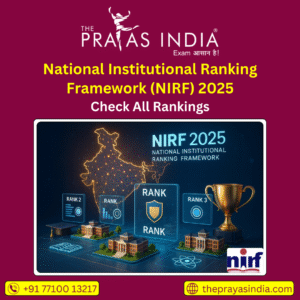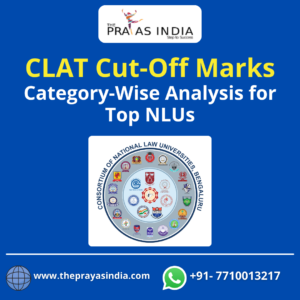Nobel Prize 2025 Winners: Revolutionizing Science, Literature, and Global Peace
The Nobel Prize is among the most prestigious international awards, annually recognizing outstanding contributions to humanity in the fields of science, literature, and peace. Founded by Alfred Nobel’s visionary will in 1895, these awards celebrate achievements that benefit humankind, spotlighting the frontiers of knowledge and social progress. The Nobel Prize 2025 winners have continued this rich legacy by making groundbreaking advances in immunology, quantum physics, materials chemistry, literature, and democratic activism, reaffirming the global impact and relevance of these recognitions.
History and Alfred Nobel’s Legacy
The Nobel Prize was first awarded in 1901, based on Alfred Nobel’s wish to reward those who “conferred the greatest benefit to humankind.” Nobel was a Swedish inventor and industrialist best known for inventing dynamite. In his will, he set up prizes in physics, chemistry, physiology or medicine, literature, and peace, aiming to promote contributions that advance knowledge and foster global harmony. The Economic Sciences prize was added later in 1969.
The Nobel Prizes are conferred annually with ceremonies held on December 10th—the anniversary of Nobel’s death—and have become symbols of human ingenuity, creativity, and moral courage. They inspire fresh innovations and highlight the power of peaceful cooperation.
Nobel Prize 2025 Winners and Their Contributions
| Category | Winner(s) | Contribution / Reason for Award |
|---|---|---|
| Nobel Prize in Physiology or Medicine | Mary E. Brunkow, Fred Ramsdell, Shimon Sakaguchi | Discoveries on peripheral immune tolerance and regulatory T cells (Tregs) |
| Nobel Prize in Physics | John Clarke, Michel H. Devoret, John M. Martinis | Quantum mechanical effects in macroscopic superconducting circuits (Josephson junctions) |
| Nobel Prize in Chemistry | Susumu Kitagawa, Richard Robson, Omar M. Yaghi | Development of metal-organic frameworks (MOFs) for environmental and energy applications |
| Nobel Prize in Literature | László Krasznahorkai | Visionary literature exploring human condition amid apocalyptic turmoil |
| Nobel Peace Prize | Maria Corina Machado | Courageous activism for democratic rights and peaceful transition in Venezuela |
| Sveriges Riksbank Prize in Economic Sciences | Joel Mokyr, Philippe Aghion, Peter Howitt | Research on sustained economic growth through technological progress and creative destruction |
Nobel Prize in Physiology or Medicine 2025

Awarded to Mary E. Brunkow, Fred Ramsdell, and Shimon Sakaguchi for their discoveries around peripheral immune tolerance, a vital immune mechanism preventing the body from attacking its own tissues.
- This breakthrough uncovered the concept of regulatory T cells (Tregs) that act as “immune brakes,” preventing autoimmune diseases by suppressing misguided immune attacks.
- Shimon Sakaguchi first identified these Tregs in 1995, demonstrating their essential role in immune balance.
- Mary Brunkow and Fred Ramsdell linked the FOXP3 gene to the development and function of these regulatory cells, explaining how genetic defects cause severe autoimmune conditions.
- Their work opened the path for innovative immunotherapies targeting autoimmune diseases, cancer, and transplant rejection.
This fundamental advance in immunology enhances our ability to treat diseases by modulating the immune system, improving millions of lives worldwide.
Nobel Prize in Physics 2025

Awarded jointly to John Clarke, Michel H. Devoret, and John M. Martinis for pioneering research that demonstrated quantum mechanical effects such as tunneling and energy quantization in macroscopic superconducting circuits.
- They used Josephson junctions to show quantum phenomena, typically confined to microscopic particles, can manifest on a visible scale.
- Their discoveries formed a foundation for quantum computing, ultra-sensitive sensors, and quantum communications technology.
- This work bridges theoretical quantum physics and practical applications, heralding a new era in technology promising transformative impacts on computation and data security.
Nobel Prize in Chemistry 2025
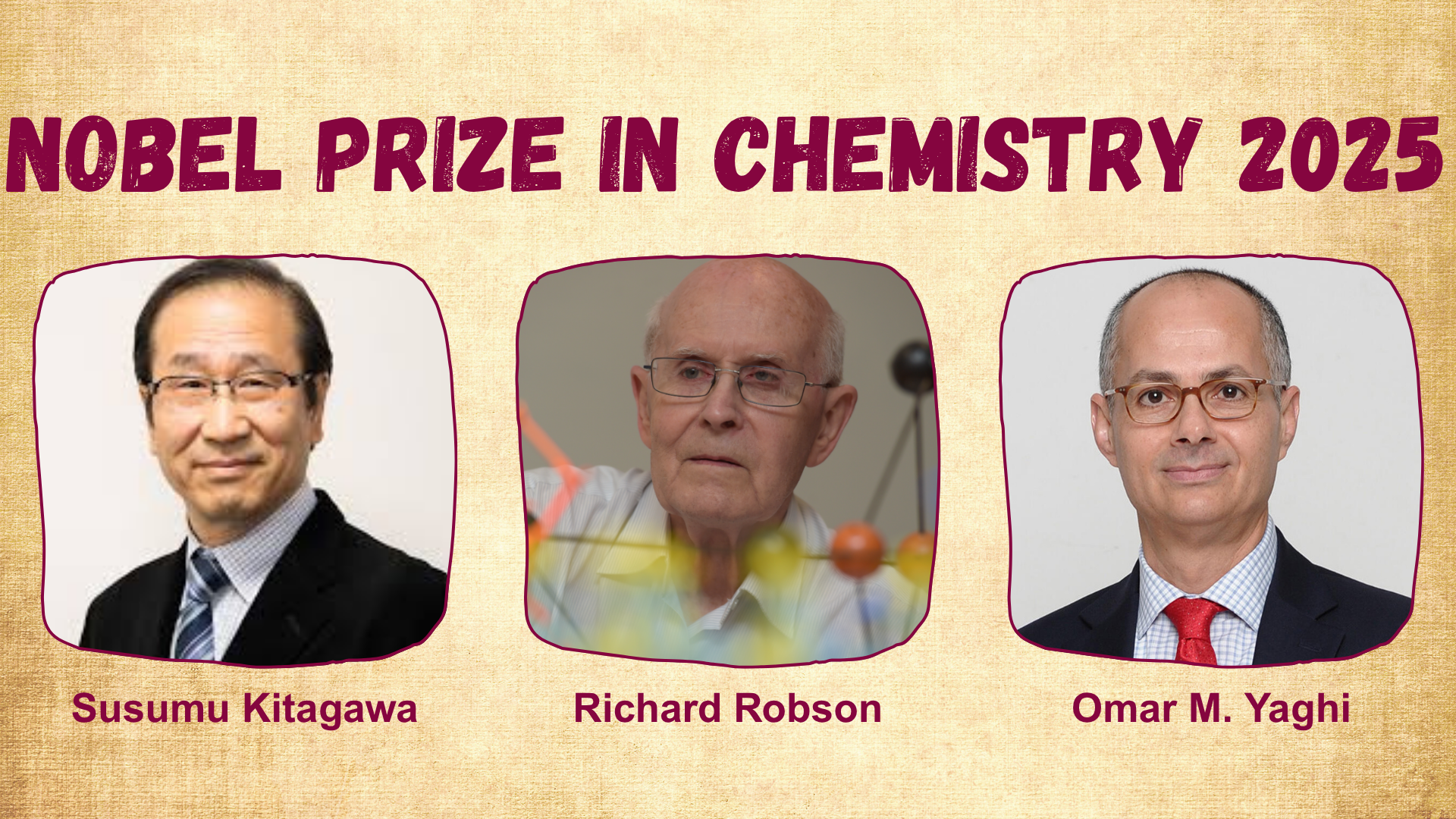
Received by Susumu Kitagawa, Richard Robson, and Omar M. Yaghi for their development of metal-organic frameworks (MOFs).
- MOFs are porous crystalline materials composed of metal ions linked by organic molecules.
- These materials capture gases, store energy, catalyze chemical reactions, and purify water with high efficiency.
- MOFs play a key role in environmental solutions like carbon capture and renewable energy technologies, contributing substantially to sustainable science.
Nobel Literature Prize 2025

Awarded to Hungarian author László Krasznahorkai for a visionary oeuvre that powerfully addresses the human condition amidst apocalyptic turmoil.
- His dense, philosophical novels such as Satantango have garnered acclaim for exploring themes of societal collapse and artistic resilience.
- Krasznahorkai’s work affirms the transformative power of art to analyze and challenge the chaos of modern existence.
Nobel Peace Prize 2025
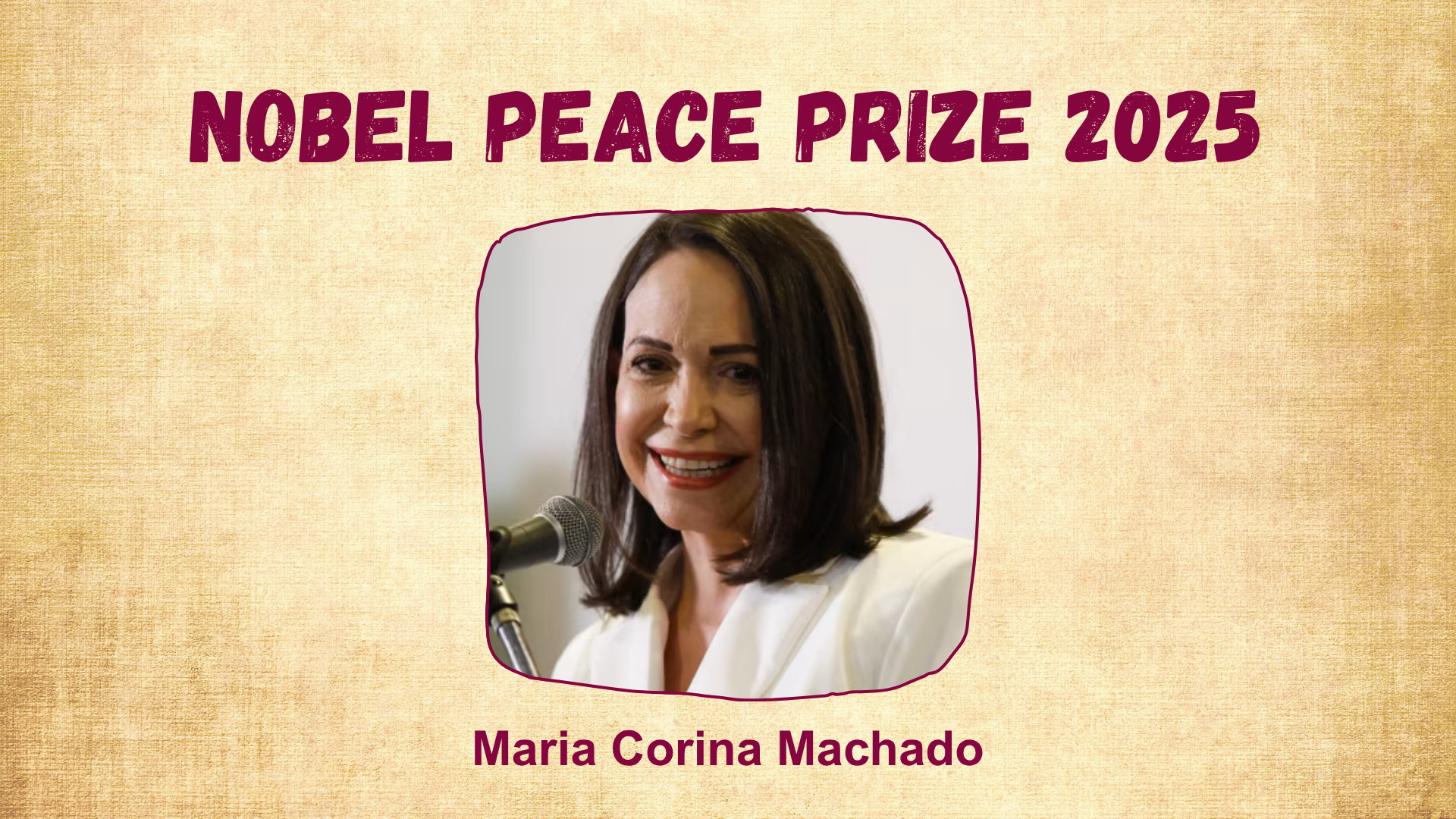
Bestowed upon Maria Corina Machado for her courageous activism promoting democratic rights and peaceful transition in Venezuela.
- Machado’s decades-long commitment to electoral transparency, human rights, and judicial independence exemplifies civilian bravery amid repression.
- Despite facing threats, harassment, and exile, her leadership has inspired democratic movements and highlighted Latin America’s struggle for freedom.
- The Norwegian Nobel Committee lauded her as an extraordinary symbol of nonviolent resistance and democratic renewal.
Sveriges Riksbank Prize in Economic Sciences in Memory of Alfred Nobel 2025

Recipients: Joel Mokyr, Philippe Aghion, Peter Howitt
Contribution: Illuminating the dynamics of sustained economic growth driven by technological progress and creative destruction.
- Joel Mokyr analyzed the conditions under which technological innovations lead to growth.
- Philippe Aghion and Peter Howitt developed the theory of creative destruction, explaining how innovation destroys old industries while creating new opportunities.
- Their collaborative work offers profound insights into economic cycles and policy design fostering innovation-led prosperity.
Impact on Science, Society, and Global Progress
The Nobel Prize 2025 highlights advances that accelerate human progress across many dimensions:
- In medicine, understanding peripheral immune tolerance enables novel therapies for autoimmune illnesses and improved cancer immunotherapies.
- The quantum physics breakthroughs underpin the emerging quantum technology revolution, offering unprecedented computational power and secure communication.
- Chemistry laureates’ MOFs address urgent environmental challenges, fostering innovations for cleaner energy and sustainability.
- Literature’s Nobel laureate deepens cultural understanding in turbulent times through profound artistic expression.
- The Peace Prize winner embodies the quest for justice, democracy, and human rights amidst political oppression.
- Economic theories deepen comprehension of growth processes guiding sustainable development policies.
Together, these winners celebrate Alfred Nobel’s vision of honoring contributions that enhance human well-being, promote justice, and elevate collective potential.
Indian Nobel Prize Winners
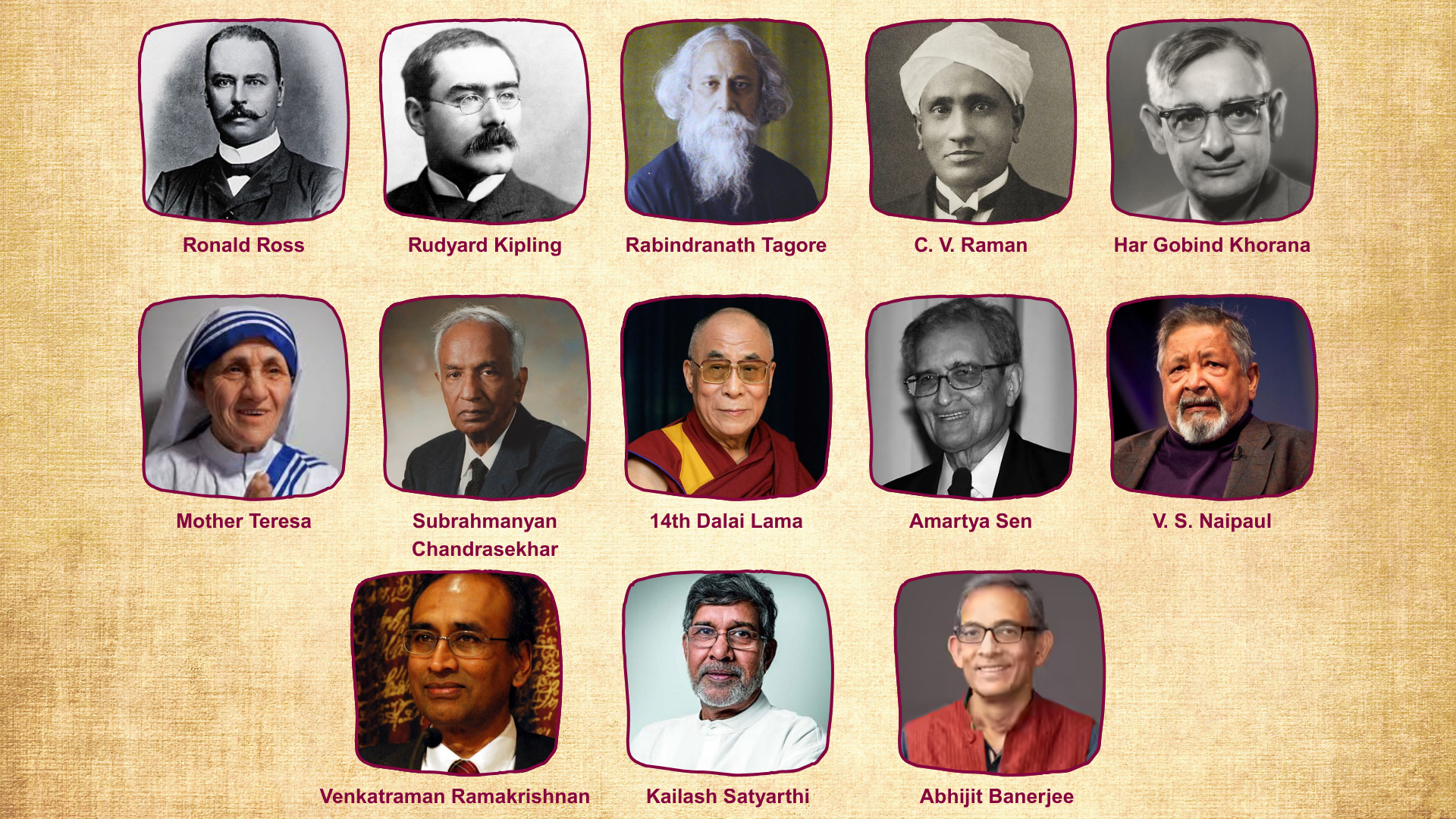
| Year | Laureate | Country of Residence | Field | Rationale |
|---|---|---|---|---|
| 1913 | Rabindranath Tagore | India | Literature | “Because of his profoundly sensitive, fresh and beautiful verse, by which, with consummate skill, he has made his poetic thought, expressed in his own English words, a part of the literature of the West.” |
| 1930 | C. V. Raman | India | Physics | “For his work on the scattering of light and for the discovery of the effect named after him.” |
| 1979 | Mother Teresa | India | Peace | “In recognition of her work in bringing help to suffering humanity.” |
| 1998 | Amartya Sen | India | Economic Sciences | “For his contributions to welfare economics.” |
| 2014 | Kailash Satyarthi | India | Peace | “For their struggle against the suppression of children and young people and for the right of all children to education.” |
| 1968 | Har Gobind Khorana | United States (born in Raipur, Punjab, British India) | Physiology or Medicine | “For their interpretation of the genetic code and its function in protein synthesis.” |
| 1983 | Subrahmanyan Chandrasekhar | United States (born in Lahore, British India) | Physics | “For his theoretical studies of the physical processes of importance to the structure and evolution of the stars.” |
| 2009 | Venkatraman Ramakrishnan | United Kingdom / United States (born in Chidambaram, India) | Chemistry | “For studies of the structure and function of the ribosome.” |
| 2019 | Abhijit Banerjee | United States (born in Krishnanagar, West Bengal, India) | Economic Sciences | “For his experimental approach to alleviating global poverty.” |
| 1902 | Ronald Ross | United Kingdom (born in Almora, British India) | Physiology or Medicine | “For his work on malaria, by which he has shown how it enters the organism and thereby has laid the foundation for successful research on this disease and methods of combating it.” |
| 1907 | Rudyard Kipling | United Kingdom (born in Bombay, British India) | Literature | “In consideration of the power of observation, originality of imagination, virility of ideas and remarkable talent for narration which characterize the creations of this world-famous author.” |
| 1989 | 14th Dalai Lama | India (born in Taktser, Amdo) | Peace | “For his consistent resistance to the use of violence in his people’s struggle to regain their liberty.” |
| 2001 | V. S. Naipaul | United Kingdom (born in Chaguanas, Trinidad and Tobago) | Literature | “For having united perceptive narrative and incorruptible scrutiny in works that compel us to see the presence of suppressed histories.” |
Quick facts
- Instituted by Alfred Nobel
- First awarded in 1901
- 6 prize categories
- Announced in October every year
- Presented at the award ceremonies on 10 December
Nobel Prize Statistics (1901–2025)
- Physics: 119 prizes awarded to 230 laureates
- Chemistry: 116 prizes awarded to 197 laureates
- Physiology or Medicine: 116 prizes awarded to 232 laureates
- Literature: 117 prizes awarded to 121 laureates
- Peace: 105 prizes awarded to 142 laureates
- Economic Sciences: 56 prizes awarded to 96 laureates
These numbers reflect the long history of the Nobel Prizes, recognizing remarkable achievements across various disciplines since their inception in 1901, with the Economic Sciences prize established later in 1969. Each prize can be awarded to up to three laureates, individually or jointly, highlighting the collaborative nature of many scientific and cultural breakthroughs.
The Nobel Prize 2025 Winners embody the spirit of innovation, courage, and creativity that propel human civilization forward. Their revolutionary discoveries in immunology, quantum physics, materials science, literary expression, and peace activism not only enhance our knowledge but also inspire global solidarity and hope. By honoring these remarkable achievements, the Nobel Prize continues to shape a better future for all.



